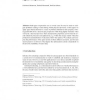Free Online Productivity Tools
i2Speak
i2Symbol
i2OCR
iTex2Img
iWeb2Print
iWeb2Shot
i2Type
iPdf2Split
iPdf2Merge
i2Bopomofo
i2Arabic
i2Style
i2Image
i2PDF
iLatex2Rtf
Sci2ools
109
click to vote
IDC
2009
Springer
2009
Springer
A Case Study on Availability of Sensor Data in Agent Cooperation
Abstract Multi-agent cooperation can in several cases be used in order to mitigate problems relating to task sharing within physical processes. In this paper we apply agent based solutions to a class of problems defined by their property of being predictable from a macroscopic perspective while being highly stochastic when viewed at a microscopic level. These characteristic properties can be found in several industrial processes and applications, e.g. within the energy market where the production and distribution of electricity follow this pattern. We evaluate and compare the performance of the agent system in three different scenarios, and for each such scenario it is shown to what degree the optimization system is dependent on the level of availability of sensor data.
Abstract Multi-agent Cooperation | Agent Based Solutions | Distributed And Parallel Computing | IDC 2009 | Physical Processes |
Related Content
| Added | 26 May 2010 |
| Updated | 26 May 2010 |
| Type | Conference |
| Year | 2009 |
| Where | IDC |
| Authors | Christian Johansson, Fredrik Wernstedt, Paul Davidsson |
Comments (0)

